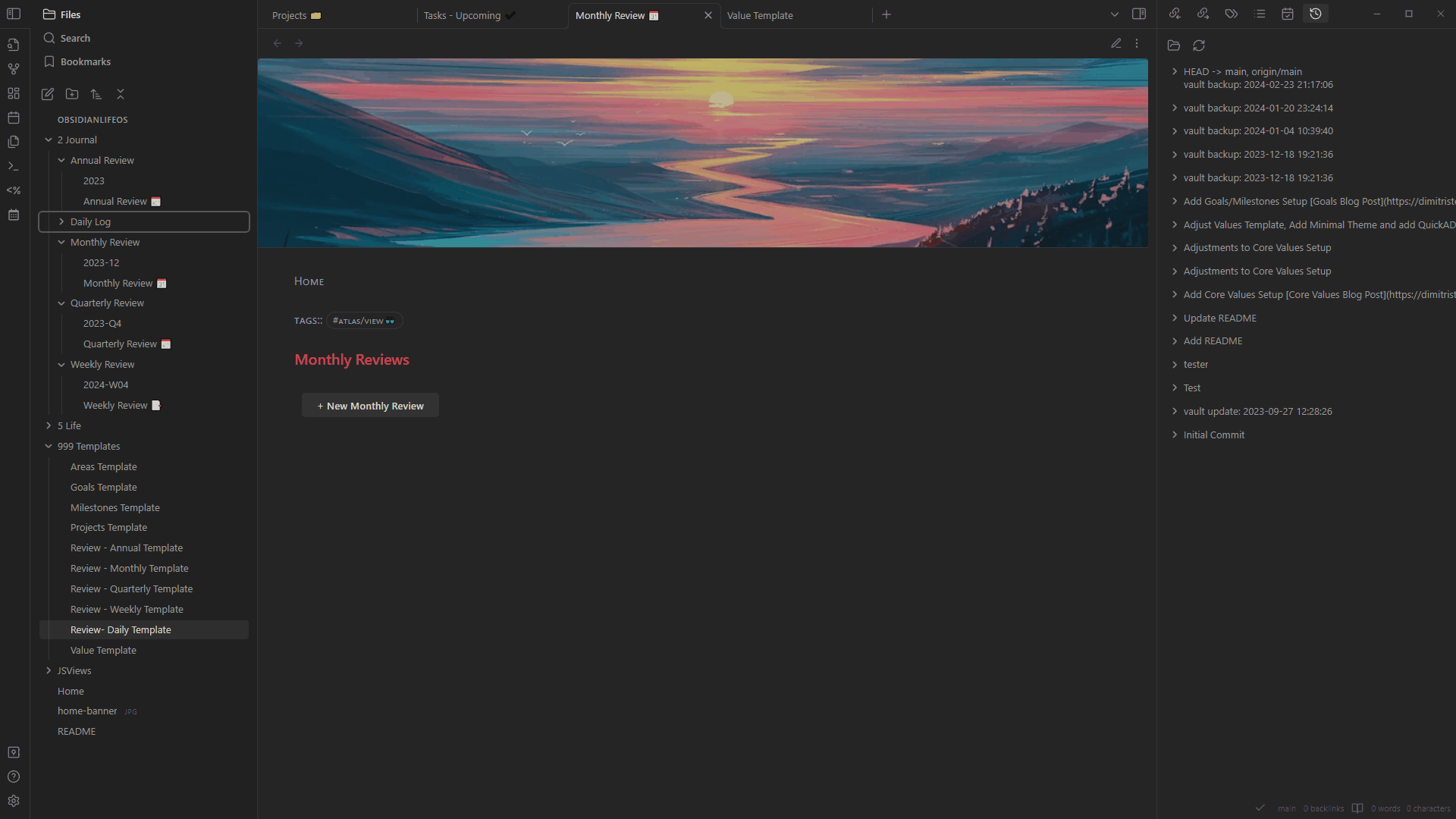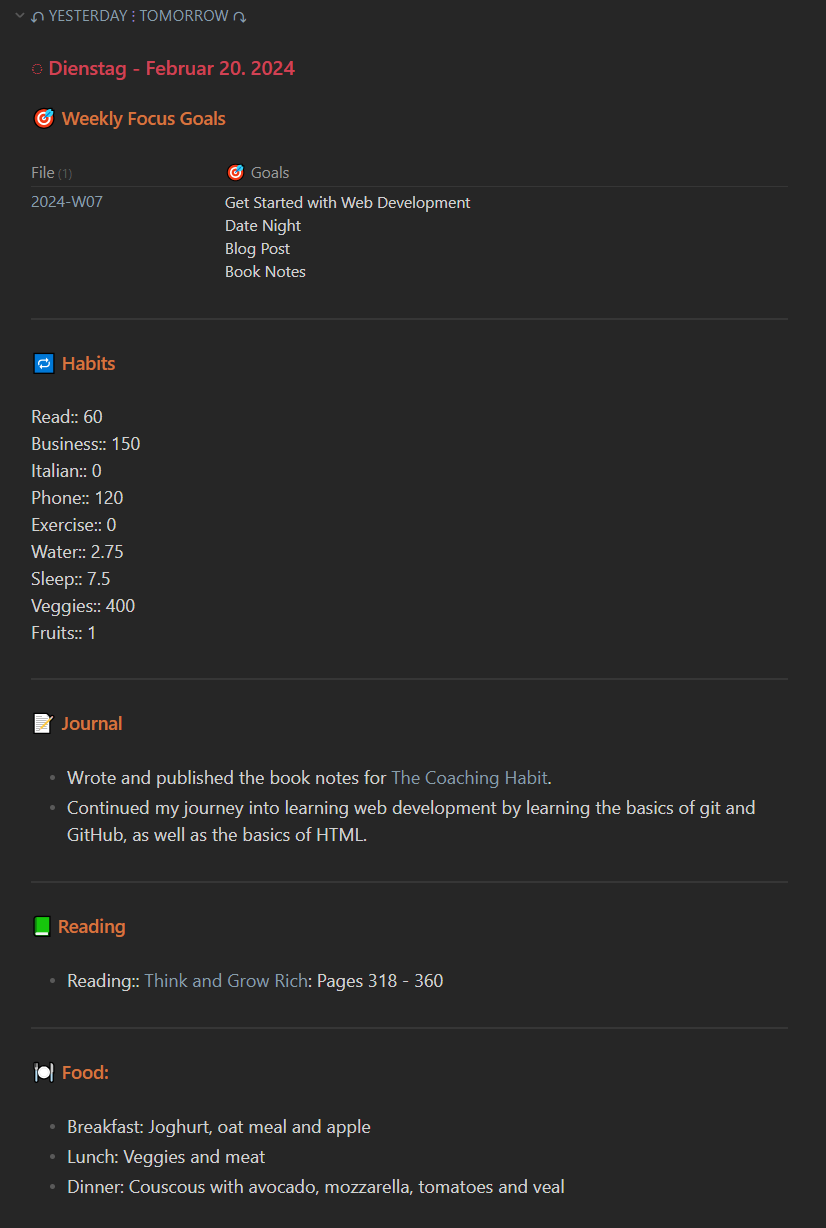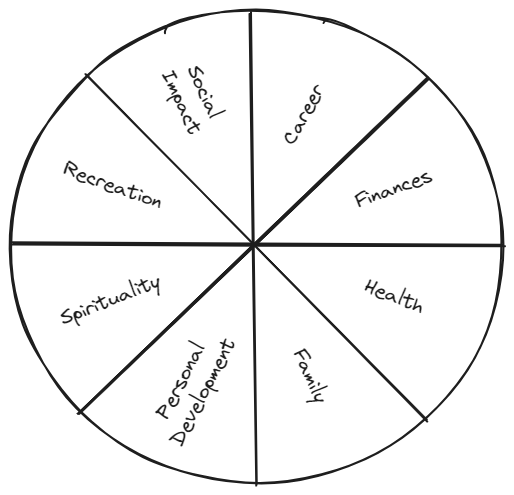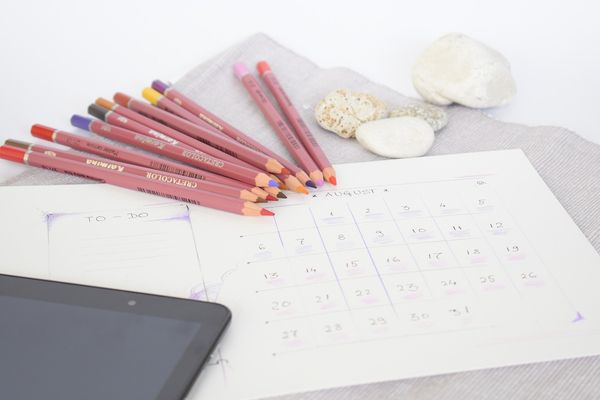My Life OS in Obsidian: Part 7 - Journaling
Unlock the Door to Self-Discovery: Embrace the Transformative Power of Journaling!
In the chaotic whirlwind of modern life, finding moments of clarity and self-reflection can seem like an elusive dream. But amidst the hustle and bustle lies a simple yet profound practice that can lead us on a journey of self-discovery and growth: journaling. Join me in this installment of the Life OS Series as we explore the art of journaling, unravel its myriad benefits, and discover how it can become your compass in navigating life's twists and turns. Whether you're seeking clarity, cultivating gratitude, or unleashing your creativity, journaling holds the key to unlocking your innermost thoughts and desires. So, grab your pen and let's embark on this journey of self-exploration together.
Welcome to the seventh part of the Life OS Series. In this article I'm going to describe the Journaling process.
Life OS Series (Click to Expand)
Journaling: A Gateway to Self-Discovery and Growth
In the hustle and bustle of our daily lives, it’s easy to get swept away by the relentless flow of tasks, responsibilities, and distractions. Amidst the chaos, however, lies a simple yet profound tool for self-reflection, growth, and personal development: journaling. In this blog post, we'll explore what journaling is, its numerous benefits, and how it can be a transformative practice in our lives.
What is Journaling?
At its core, journaling is the act of writing down thoughts, feelings, experiences, and observations on a regular basis. It can take many forms, from traditional pen-and-paper journaling to digital platforms and even voice recordings. The beauty of journaling lies in its flexibility and adaptability to suit individual preferences and needs.
Forms of Journaling
While the essence of journaling remains constant, the form it takes can vary widely depending on individual preferences and needs. Here are some common forms of journaling:
- Free-Writing: This involves writing without constraints or a specific agenda. It’s a stream-of-consciousness approach where thoughts flow freely onto the page, unfiltered and uncensored.
- Gratitude Journaling: In this form, individuals express gratitude for the people, experiences, and blessings in their lives. It's a practice known to cultivate positivity, resilience, and a sense of abundance.
- Reflective Journaling: This involves reflecting on past experiences, events, or interactions to gain insights, lessons, or perspectives. It’s a way to process emotions, make sense of complex situations, and foster personal growth.
- Bullet Journaling: Popularized by Ryder Carroll, bullet journaling is a structured approach to organization and productivity. It combines elements of to-do lists, calendars, goal tracking, and creative expression to help individuals manage their lives more effectively.
- Dream Journaling: This involves recording dreams upon waking to explore their symbolism, themes, and significance. It’s a practice that can offer insights into the subconscious mind and facilitate self-discovery.
- Art Journaling: For those inclined towards visual expression, art journaling combines writing with art, doodles, collages, and mixed media. It’s a creative outlet for exploring emotions, ideas, and experiences in a visually engaging way.
The Benefits of Journaling
- 👓 Clarity and Insight: Journaling provides a safe space to explore our innermost thoughts and emotions. By putting pen to paper (or fingers to keyboard), we can gain clarity on complex issues, unravel tangled emotions, and uncover insights that may have eluded us otherwise.
- 😄 Emotional Regulation: Expressive writing has been shown to have therapeutic effects on mental health. By articulating our feelings and experiences, we can better understand and process them, leading to reduced stress, anxiety, and depression.
- 🎯 Goal Setting and Accountability: Keeping a journal can help us track our progress towards personal and professional goals. By documenting our aspirations, outlining action plans, and reflecting on our achievements and setbacks, we can stay motivated and accountable to ourselves.
- 🌱 Self-Discovery and Growth: Journaling is a journey of self-discovery. As we delve into our thoughts, beliefs, and values, we gain deeper insights into ourselves and our place in the world. This process of self-reflection fosters personal growth, resilience, and a greater sense of purpose.
- 💡 Creativity and Innovation: Many creative individuals, from writers to artists to entrepreneurs, swear by the power of journaling to fuel their creativity and innovation. By capturing ideas, inspiration, and observations, we can tap into our creative potential and cultivate a mindset of curiosity and exploration.
- 🧘♂️ Stress Reduction and Well-Being: The simple act of journaling can be a form of self-care. Taking time out of our day to reflect, express gratitude, and document positive experiences can promote overall well-being and resilience in the face of life’s challenges.
Tips for Effective Journaling
- 🔁 Consistency is Key: Set aside dedicated time each day or week for journaling, and stick to it. Whether it’s first thing in the morning, before bed, or during your lunch break, find a routine that works for you.
- ✏️ Write Freely and Honestly: Don’t censor yourself or worry about grammar and punctuation. Journaling is a judgment-free zone where you can express yourself freely and authentically.
- 🧪 Experiment with Different Formats: Explore different journaling techniques, such as stream-of-consciousness writing, gratitude journaling, or bullet journaling, to find what resonates with you.
- 🤔 Review and Reflect: Periodically review your journal entries to track your progress, identify recurring themes, and celebrate your achievements. Use these insights to inform your future goals and actions.
In conclusion, journaling is a powerful tool for self-discovery, personal growth, and well-being. Whether you’re navigating life transitions, seeking clarity on your goals, or simply looking for a creative outlet, the benefits of journaling are undeniable. So grab a pen and paper, or open a blank document on your device, and start exploring the depths of your inner world. Your journey awaits.
My Journaling Process
Journaling is part of my Daily Log file (see Obsidian Setup below for more details). I set aside 15 minutes every evening and reflect on my day by asking myself various questions, for example:
- Did I make progress towards my goals? If yes, why? If no, why not?
- What were the wins of the day?
- What challenges did I face?
- What did I learn?
- What could I do better?
- What am I grateful for?
I note down the answers to these questions and any other noteworthy experiences of my day. I use these journal entries in my weekly review (see previous part) to reflect on my week.
Obsidian Setup
Prerequisites
Follow the video below to configure the Periodic Notes plugin (installed in the previous part of the series) for daily notes.

Template
Now let's create the template to be used for the daily log.
Create a file called Review - Daily Template in the folder 999 Templates and add the following content:
Code
---
full-date: <% tp.file.title %>
week: <% tp.date.now("YYYY-[W]ww", 0, tp.file.title, "YYYY-MM-DD") %>
month: <% tp.date.now("YYYY-MM MMMM", 0, tp.file.title, "YYYY-MM-DD") %>
year: <% tp.date.now("YYYY", 0, tp.file.title, "YYYY-MM-DD") %>
---
⠀
###### [[<% tp.date.now("YYYY-MM-DD", -1, tp.file.title, "YYYY-MM-DD") %>|↶ YESTERDAY]] ⁝ [[<% tp.date.now("YYYY-MM-DD", 1, tp.file.title, "YYYY-MM-DD") %>|TOMORROW ↷]]
# ◌ <% tp.date.now("dddd - MMMM Do YYYY", 0, tp.file.title, "(📅) YYYY-MM-DD") %>
## 🎯 Weekly Focus Goals
```dataview
TABLE
focusgoal AS "🎯 Goals"
FROM "2 Journal/Weekly Review"
WHERE week = "<% tp.date.now('YYYY-[W]ww', -7, tp.file.title, 'YYYY-MM-DD') %>"
```
---
## 🔁 Habits
Read::
Business::
Italian::
Phone::
Exercise::
Water::
Sleep::
Veggies::
Fruits::
---
## 📝 Journal
- ...
^life-link
---
## 📗 Reading
- Reading::
---
## 🍽️ Food:
- Breakfast:
- Lunch:
- Dinner:
^food-link
---This template feeds the weekly review with various information such as the food I ate, which books I read, my habit progress (see future blog post about the habit system in Obsidian) and my journal entries. In addition it shows my weekly goals, which I set in the weekly review.
At the top it creates navigators to the previous and the next day and adds the day and long date as a title.
This template will be used when you click on a date in the Obsidian Calendar.

Stay Tuned
Thank you for joining me on this journey of self-discovery through journaling! In the next installment of the Life OS Series, we'll delve into the fascinating world of book reading and note-taking. Get ready to unlock the secrets of building a personal library of knowledge, seamlessly integrated into your digital life through Obsidian.
In the upcoming post, I'll share insights into my book reading workflow, including how I take notes on the books I read, strategies for organizing information effectively, and tips for creating a visual library in Obsidian. Whether you're an avid reader seeking to enhance your learning experience or someone looking to cultivate a deeper understanding of the world around you, this installment will equip you with practical tools and techniques to elevate your reading journey.
Stay tuned for a captivating exploration of how to transform your reading habits into a powerful tool for personal growth and intellectual enrichment. Until then, keep journaling, keep exploring, and keep embracing the transformative power of self-discovery!



